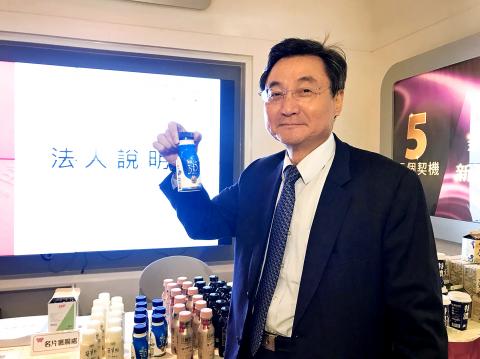Foodmaker Wei Chuan Foods Corp (味全食品) yesterday reported that losses at its core businesses had narrowed in the first half of the year, driven by a turnaround in its operations in Taiwan and China.
Net income in the first half rose 26 percent annually to NT$6.21 million (US$201,781), with sales gaining 11.6 percent to NT$8.83 billion. Earnings per share were NT$0.12.
Wei Chuan posted an aggregate operating income of NT$125 million to the end of June, up from NT$77 million in the red a year earlier, while operating margin jumped to 1.42 percent from minus-0.97 percent a year earlier.

Photo: CNA
Over the period, gross income rose 19.2 percent to NT$2.67 billion, with gross margin increasing by 1.9 percentage points to 30.2 percent.
However, the company saw foreign-exchange losses last quarter as a weaker New Taiwan dollar led to a spike in interest payments on its US-dollar-denominated loans, leading to a net loss of NT$54.81 million after five consecutive quarters of profit.
The company would continue to improve its capital structure and revitalize its assets, Wei Chuan spokesperson Chang Mei-huang (張美凰) told an investors’ conference in Taipei.
Chang said that the company has sold its 51 percent stake in Ting Lu Development (頂率開發), a subsidiary of Ting Hsin International Group (頂新集團) — Wei Chuan’s parent company.
Ting Lu was set up to develop a plot of land owned by the foodmaker, Chang said.
Wei Chuan is expected to book NT$880 million in profit from the sale before the end of next month, which is expected to boost earnings per share performance by NT$1.74, Chang said.
The sale would cut Wei Chuan’s annual interest expenses by NT$100 million and reduce its exposure to foreign-exchange volatility, Chang said.
The company has been diversifying into juices, bottled coffee, yogurt beverages and functional beverages containing lactic acid bacteria to cut reliance on milk products, which in the past made up 70 to 80 percent of annual sales, Wei Chuan chief executive officer Michael Su (蘇守斌) said.
The company has a 22.9 percent share of the wholesale milk market, as well as 11.3 percent in drinking yogurt, 33 percent in bottled juice and 39.1 percent in bottled coffee, Su said.
The company would continue to expand milk production in China to tap into contract manufacturing and supply partnerships with global brands, Su said.
At the end of June, sales in China made up 56 percent of the total, exceeding sales in Taiwan for the first time, company data showed.
China logged sales growth of 17.4 percent at the end of June, compared with a 6.9 percent increase in Taiwan, data showed.

Greek tourism student Katerina quit within a month of starting work at a five-star hotel in Halkidiki, one of the country’s top destinations, because she said conditions were so dire. Beyond the bad pay, the 22-year-old said that her working and living conditions were “miserable and unacceptable.” Millions holiday in Greece every year, but its vital tourism industry is finding it harder and harder to recruit Greeks to look after them. “I was asked to work in any department of the hotel where there was a need, from service to cleaning,” said Katerina, a tourism and marketing student, who would

i Gasoline and diesel prices at fuel stations are this week to rise NT$0.1 per liter, as tensions in the Middle East pushed crude oil prices higher last week, CPC Corp, Taiwan (台灣中油) and Formosa Petrochemical Corp (台塑石化) said yesterday. International crude oil prices last week rose for the third consecutive week due to an escalating conflict between Israel and Iran, as the market is concerned that the situation in the Middle East might affect crude oil supply, CPC and Formosa said in separate statements. Front-month Brent crude oil futures — the international oil benchmark — rose 3.75 percent to settle at US$77.01

Merida Industry Co (美利達) has seen signs of recovery in the US and European markets this year, as customers are gradually depleting their inventories, the bicycle maker told shareholders yesterday. Given robust growth in new orders at its Taiwanese factory, coupled with its subsidiaries’ improving performance, Merida said it remains confident about the bicycle market’s prospects and expects steady growth in its core business this year. CAUTION ON CHINA However, the company must handle the Chinese market with great caution, as sales of road bikes there have declined significantly, affecting its revenue and profitability, Merida said in a statement, adding that it would

UNCERTAINTIES: The world’s biggest chip packager and tester is closely monitoring the US’ tariff policy before making any capacity adjustments, a company official said ASE Technology Holding Inc (日月光投控), the world’s biggest chip packager and tester, yesterday said it is cautiously evaluating new advanced packaging capacity expansion in the US in response to customers’ requests amid uncertainties about the US’ tariff policy. Compared with its semiconductor peers, ASE has been relatively prudent about building new capacity in the US. However, the company is adjusting its global manufacturing footprint expansion after US President Donald Trump announced “reciprocal” tariffs in April, and new import duties targeting semiconductors and other items that are vital to national security. ASE subsidiary Siliconware Precision Industries Co (SPIL, 矽品精密) is participating in Nvidia